Mar 14, 2022
💐Korean Irregular Verb Lesson by Anna쌤💐
🔰Irregular Verb 불규칙 동사 (ㅂ)
When ㅂ irregular stems are followed by a vowel, the ㅂ is dropped and 우 is added to the stem.
🔺고맙(다) to be thankful
고맙 - ㅂ → 우 + 아/어요 = 고마워요
🔺맵(다)
맵 - ㅂ → 우 + 아/어요 = 매워요
🔺춥(다) to be cold
춥 - ㅂ → 우 + 아/어요 = 추워요
🔺덥(다) to be hot
덥 - ㅂ → 우 + 아/어요 = 더워요
However there are 2 words (곱다 beautiful/pretty, 돕다 help) that meets 아/어요. The ㅂ will change to 오.
🔺곱(다)
곱 - ㅂ → 오 + 아/어요 = 고와요
🔺돕(다)
돕 - ㅂ → 오 + 아/어요 = 도와요
‼️Note that many verbs/adjectives with a ㅂ 받침 are regular (the ㅂ does not change).
Regular Verbs
입다 (wear)
> 입습니다 > 입어요 > 입으면
잡다 (catch)
> 잡습니다 > 잡아요 > 잡으면
좁다 (narrow)
> 좁습니다 > 좁아요 > 좁으면
접다 (fold)
> 접습니다 > 접아요 > 접으면
집다 (pick up)
> 집습니다 > 집어요 > 집으면
씹다 (chew)
> 씹습니다 > 씹어요 > 씹으면
뽑다 (select, hire)
> 뽑습니다 > 뽑아요 > 뽑으면
💐 Irregular Verb List of ㅂ 💐
쉽다 To be easy
맵다 To be spicy
춥다 To be cold
덥다 To be hot
돕다* To help
곱다* To be charming, to be lovely
굽다 To roast, to bake
깁다 To sew, to mend
줍다 To pick up; To find
눕다 To lie
무겁다 To be heavy
가볍다 To be light
고맙다 To be thankful
어렵다 To be difficult
더럽다 To be dirty
무섭다 To be scary, to be frightening
두렵다 To be fearful, to be scared
반갑다 To be glad, to be pleasant
부럽다 To be envious
어둡다 To be dark, to be gloomy
즐겁다 To be pleasant, to be enjoyable
귀엽다 To be cute
참답다 To be truthful, to be sincere
새롭다 To be new
외롭다 To be lonely, to be solitary
해롭다 To be detrimental
이롭다 To be beneficial
아름답다 To be beautiful
까다롭다 To be picky to be choosy
흥미롭다 To be interesting
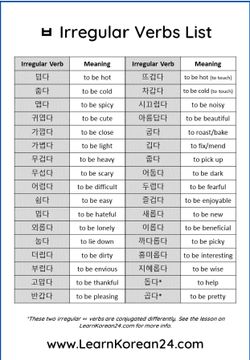
🔰ㅅ Irregular Verb 불규칙 동사 (ㅅ)
‼️Rule 1
Irregular ㅅ verbs and adjectives only behave irregularly when conjugated with endings that start with a vowel.
For example, endings such as 아요/어요 (present tense), ~(으)면 ( if)
With other endings that start with a consonant, for example (e.g. (스)ㅂ니다, irregular ㅅ verbs and adjectives do not behave irregularly. That is, they are conjugated just the same as regular verbs.
‼️Rule 2
When conjugating ㅅ irregular verbs with endings that start with a vowel, ㅅ is always dropped from the verb stem.
For example
긋다 (to draw) + 아요/어요 = 그어요.
This is because ㅅ is dropped from the verb stem before adding 아요/어요.
‼️Rule 3
Vowels do not combine when conjugating ㅅ irregular verbs.
For example
마시다 (to drink) + 아요/어요 (present tense) = 마셔요 (NOT 마시어요).
This is because the vowel ㅣ from the verb stem and the vowel ㅓ from the ending combine to make ㅕ.
짓다 (to build) + 어요 = 지어요 (NOT 져요)
낫다 (be better) + 아요 = 나아요 (NOT 나요)
🌟Example Sentence (irregular)
🔺한국에서는 아파트를 많이 지어요. (짓다)
In Korea, they build lots of apartments.
🔺저는 책을 읽을 때 단어에 밑줄을 그어요. (긋다)
When I read books, I underline the words.
🔺밤늦게 라면을 먹으면 다음날 얼굴이 부어요. (붓다)
If you eat noodles late at night, you will have a swollen face the next day.
🌟Regular Verbs
웃다 (laugh)
> 웃습니다 > 웃어요 >웃어서 > 웃으면
씻다 (wash)
> 씻습니다 > 씻어요 > 씻어서 > 씻으면
벗다 (take off)
> 벗습니다 > 벗어요 > 벗어서 > 벗으면
빗다 (comb)
> 빗습니다 > 빗어요 > 빗어서 --> 빗으면
빼앗다 (take by force)
> 빼앗습니다 > 빼앗어요 > 빼앗으면
❣️Example Sentences
🔺농담을 듣고 한바탕 크게 웃어요.
I have a good laugh at joke.
🔺그 사람이 내 물건을 빼앗았어요.
He took my stuff away.
🔺밥 먹기 전에 손을 꼭 씻어야 해요.
You have to wash your hands before having a meal.
🌟ㅅ Irregular Verb / ㅅ 불규칙
긋다 To draw (a line)
낫다 To be better; To be cured
젓다 To stir, to whip
잣다 To spin
짓다 To build, to write
잇다 To connect, to link
붓다 To swell; To pour
특징짓다 To characterize
눈물짓다 To shed tears, to weep
농사짓다 To farm
가로젓다 To shake your head
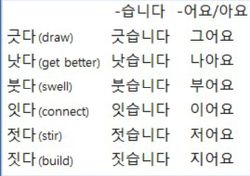
🔰으 Irregular Verb 불규칙 동사
‼️For verb and adjective stems with (으).
(으) is omitted without exception when adding an ending that begins with 아/어.
Then, the vowel that precedes determines whether 아 or 어 is used in the ending.
🔺When the vowel is 아 or 오, 아요 is used
🔺when the vowel is not 아 or 오 어요 is used.
⭐바쁘(다) + 아/어 = 바ㅃ => 바(vowel ㅏ) + 아 = 바빠
⭐예쁘(다) + 아/어 > 예배 > 예 (vowel ㅖ) + 어 예뻐
⭐쓰(다) + 아/어 = ㅆ > no preceding syllable + 어 > 써
Example Sentence:
1. 지난주에 아주 바빴어요.
I was really busy last week.
2. 오랜만에 친구를 만나서 정말 기뻤어요.
I was so happy to meet my friend who haven't seen for a long time.
3. 친구한테 편지를 썼어요.
I wrote a letter to my friend.
ㅡ Irregular Verb / ㅡ 불규칙
크다 To be big
쓰다 To write; To use
끄다 To turn off
예쁘다 To be pretty
바쁘다 To be busy
아프다 To be painful, to be sick
고프다 To be hungry
나쁘다 To be bad
기쁘다 To be happy
슬프다 To be sad
잠그다 To lock
모으다 To gather, to collect
🔰 르 Irregular Verbs
Irregular verbs and adjectives ending in 르 only behave irregularly when an ending starting with 아 or 어 is attached.
For example
Grammar pattern like 아요/어요 (present tense), 았어요/었어요 (past tense), etc.
With endings which do not start with 아 or 어, they do not behave irregularly and are just conjugated the same as normal.
‼️Rule 1
When conjugating irregular 르 V/Adj with endings starting with 아 or 어, ㅡ is always dropped and an additional ㄹ is added.
When conjugated in the present tense, 모르다 becomes 몰라요. This is because ㅡ is dropped and an additional ㄹ is added before the ending 아요.
모르(다) to not know
모르 - ㅡ = 모ㄹ
모ㄹ + ㄹ = 몰ㄹ
몰ㄹ + 아/어요 = 몰라요
모르다 + 아/어 = 모(ㅗ vowel) + ㄹ라 or ㄹ러 > 몰라요 / 몰랐어요 / 몰라서
‼️Rule 2
The vowel that comes before 르 determines whether 아 or 어 is used in the ending.
빠르다 + 아/어 = 빠(ㅏ vowel) + ㄹ라 or ㄹ러 > 빨라요/ 빨랐어요 / 빨라서
빠르다 = to be fast
빠르 - ㅡ = 빠ㄹ
빠ㄹ + ㄹ = 빨ㄹ
빨ㄹ + 아/어요 = 빨라요
다르다 + 아/어 = 다(ㅏ vowel) + ㄹ라 or ㄹ러 > 달라요/ 달랐어요 / 달라서
다르(다) to be different
다르 - ㅡ = 다ㄹ
다ㄹ + ㄹ = 달ㄹ
달ㄹ + 아/어요 = 달라요
자르다 + 아/어 = 자(ㅏ vowel) + ㄹ라 or ㄹ러 > 잘라요/ 잘랐어요 / 잘라서
자르(다)
자르 - ㅡ = 자ㄹ
자ㄹ + ㄹ = 잘ㄹ
잘ㄹ + 아/어요 = 잘라요
고르다 + 아/어 => 고(ㅗ vowel) + ㄹ라 or ㄹ러 => 골라요/ 골랐어요 / 골라서
고르(다) to choose
고르 - ㅡ = 고ㄹ
고ㄹ + ㄹ = 골ㄹ
골ㄹ + 아/어요 = 골라요
흐르다 + 아/어 => 흐(ㅡ vowel) + ㄹ러 => 흘러요/ 흘렀어요 / 흘러서
흐르(다)
흐르 - ㅡ = 흐ㄹ
흐ㄹ + ㄹ = 흘ㄹ
흘ㄹ + 아/어요 = 흘러요
기르다 + 아/어 => 기(ㅣ vowel) + ㄹ라 or ㄹ러 => 길러요/ 길렀어요 / 길러서
기르(다)
기르 - ㅡ = 기ㄹ
기ㄹ + ㄹ = 길ㄹ
길ㄹ + 아/어요 = 길러요
제 언니하고 저는 아주 많이 달라요.
My sister and I are very different.
머리를 잘라서 시원해요.
It is very cool because I got my hair cut.
너무 빨라서 못 봤어요.
I couldn’t see anything because it was too fast.
한국어를 몰라서 불편했어요.
It was very inconvenient because I didn’t speak(know) Korean.
아무거나 골라 보세요.
You can choose anything.
눈물이 흘러서 안 보였어요.
I couldn’t see well because I was crying.
이 채소들을 잘 길러서 팔 거예요.
I will grow these vegetables and sell them.
🔰르 Irregular Verb / 르 불규칙
빠르다 To be fast
다르다 To be different
가르다 To cut
거르다 To skip; To filter out
고르다 To select, to choose
구르다 To roll; To stamp one’s feet
그르다 To be wrong, to be false
기르다 To raise, to bring up
나르다 To carry, to transport
누르다 To press, to push
도르다 To vomit; To distribute
두르다 To put something around
마르다 To dry
모르다 To not know; To not understand
무르다 To be soft, to be runny
바르다 To cover; To smear
부르다 To call out; To be full
사르다 To commit to the flame; To winnow
어르다 To humour, to coax
오르다 To climb up, to go up
이르다* To be early
자르다 To cut, to chop
조르다 To pester, to nag
지르다 To yell, to shriek
찌르다 To pierce, to stab
흐르다 To flow, to run
휘두르다 To wield, to brandish
타오르다 To blaze, to rage
차오르다 To wax; To bubble over
짓누르다 To press
주무르다 To massage
저지르다 To commit something, to do (something bad)
억누르다 To suppress, to contain
어지르다 To mess up, to make a mess
어우르다 To put together, to unite
앞지르다 To pass, to overtake
암지르다 To complete
아우르다 To put together
서두르다 To rush, to hasten
문지르다 To rub; To scrub
무찌르다 To defeat, to beat
목마르다 To be thirsty
머무르다 To stay, to remain
마무르다 To finish, to complete
떠오르다 To come up; To float
다지르다 To make sure; To press a person
그느르다 To take care of, to look after
가새지르다 To cross each other, to intersect
가로지르다 To cut across, to traverse
기어오르다 To crawl up, to creep up
날아오르다 To fly up high, to soar
달아오르다 To become red-hot
뛰어오르다 To jump, to leap
솟아오르다 To soar into, to fly up
윽박지르다 To bully, to browbeat
🔰ㅎ Irregular
🔰ㅎ final consonant has lots of changes when it meets a vowel.
‼️1. When a lot of adjective which have ㅎ final consonant meets -(으) verb ending, drops.
빨갛(다) red => 빨가+(으)ㄴ => 빨간
하얗(다) white => 하야 (으)ㄹ까 => 하얄까
그렇(다) be like that = 그러+(으)니까 => 그러니까
이렇다 be like this = 이러+(으)면 이러면
‼️2. ㅎ final consonant meets - 아/어 verb ending and 아/어 change to 애/에.
Red 빨갛(다) > 빨가+아/어요 => 빨개요
White 하얗(다) > 하야+아/어요 => 하얘요
그렇(다) > 그러+아/어서 => 그래서
저렇(다) => 저러+아/어서 => 저래서
‼️3. There are some adjective/verb that don't change.
to be good 좋(다)+아요 => 좋아요
to be many 많(다)+(으)ㄴ 많은
give birth 낳다 +아서 = 낳아서.
to put 넣다 + (으)면 넣으면
to touch 닿(다)+(으)는 것이다 => 닿을 거예요
ㅎ + (으) > ㅎ is drop
ㅎ + 아/어 > 애
🔰Example Sentence:
1. 저는 빨간색을 가장 좋아합니다.
Red is my favorite color.
2. 오늘은 좀 피곤해요. 그러니까 내일 가요.
1 am tired today, so let's go tomorrow.
3. 많은 사람들이 선물을 책상 위에 놓았다. Many people put their gifts on the desk.
4. 언니가 8월에 아이를 낳을 거예요. My sister is going to have a baby in August.
🔰List
ㅎ Irregular Verb / ㅎ 불규칙
까맣다 To be black
하얗다 To be white
노랗다 To be yellow
파랗다 To be blue
빨갛다 To be red
이렇다 To be like this
그렇다 To be like that
저렇다 To be like that over there
어떻다 To be like what, to be how
뿌옇다 = to be hazy
노랗다: 노랗 → 노라 + 아/어요 → 노래요
빨갛다: 빨갛 → 빨가 + 아/어요 → 빨개요
하얗다: 하얗 → 하야 + 아/어요 → 하얘요
까맣다: 까맣 → 까마 + 아/어요 → 까매요
파랗다: 파랗 → 파라 + 아/어요 → 파래요
뿌옇다: 뿌옇 → 뿌여 + 아/어요 → 뿌예요
🔰ㄷ Irregular
Some stems of ㄷ irregulars change to ㄹ when a suffix begins with a vowel.
Format:
Verb(ㄷ ending) + vowel - ㄷ changes to ㄹ
걷(다) + 어요 → 걸어요
걷(다) + (으)면 → 걸으면
Example Sentence:
1. 저기까지 같이 걸어 가요.
Let's walk over there together.
2. 이길을 걸으면 옛날 친구 생각이 나요.
When I walk this street think of my old friend.
3. 음악을 들으면 마음이 편해요.
I am very relaxed when l listen to music.
4. 문을 닫으세요.
Please close the door.
🔰ㄷ Irregular Verb / ㄷ 불규칙
듣다 To listen; To hear
묻다 To ask
걷다 To walk
싣다 To load
붇다 To swell; To rise
치닫다 To run up, to go up
깨닫다 To realize, to notice
파묻다 To bury
알아듣다 To understand, to follow
Regular ㄷ Verbs
닫다 – to close
믿다 – to believe
받다 – to receive
얻다 – to get
묻다 – to bury
쏟다 – to pour
돋다 – to rise
곧다 – to be straight
굳다 – to harden
딛다 – to step
내딛다 – to step forward
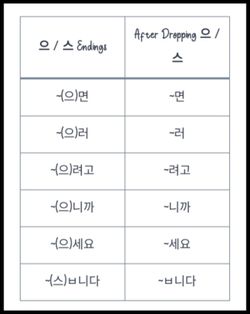
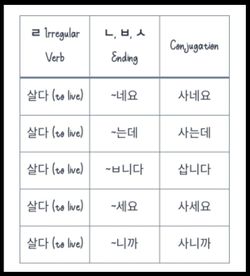
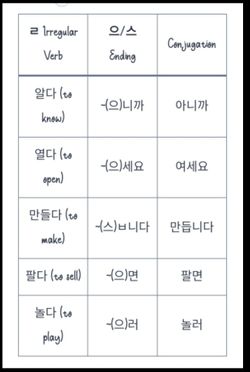
🔰 ㄹ Irregular Verb 불규칙
‼️Rule 1: Endings Starting With ㄴ,ㅂ,ㅅ
To conjugate ㄹ irregular verbs with endings starting with ㄴ,ㅂ,or ㅅ, ㄹ is dropped from the verb stem.
For example
살다 (to live) + the ending 네요 becomes 사네요.
This is because ㄹ is dropped from the verb stem before adding the ending.
‼️Rule 2: Endings Starting With 으 or 스
When conjugating ㄹ irregular verbs with endings starting with 으 or 스, the first thing you must do is drop 으 / 스 from the ending.
After dropping 으 / 스 from the ending, the next thing you must do is decide whether or not to drop ㄹ from the verb stem.
살다 + (으)니까 = 사니까
살다 + (으)면 = 살면
‼️Rule 3: Endings Starting With (으)ㄹ
This next conjugation rule is quite simple. When you want to conjugate ㄹ irregular verb with an ending which starts with (으)ㄹ, drop (으)ㄹ from the ending.
For example:
만들다 (to make) + (으)ㄹ 거예요 (future tense ending) = 만들 거예요.
‼️Rule 4: All Other Endings
When conjugating an irregular ㄹ verb with an ending which is different to the ones mentioned above, then there is no special conjugation rule. They are conjugated just the same as regular verbs and adjectives.
For example
알다 (to know) + 아요/어요 (present tense) = 알아요.
In this example, just like regular verbs, the verb stem does not change.
❣️ㄹ Irregular Example Sentences
어디에 사세요? (살다)
Where do you live?
우리 집은 직장에서 멉니다. (멀다)
My house is far from my workplace.
더워요? 창문을 좀 열까요? (열다)
Are you hot? Shall I open the window?
우리 내일 같이 놀까요? (놀다)
Shall we hang out tomorrow?
외국 생활은 힘들지만 재미있어요. (힘들다)
Living overseas is hard, but it is fun.
🔰ㄹ Irregular Verb / ㄹ 불규칙
열다 To open
멀다 To be far
살다 To live
팔다 To sell
놀다 To play
알다 To know
달다 To weigh; To be sweet
불다 To blow
길다 To be long
걸다 To hang
밀다 To push, to nudge
울다 To cry, to weep
들다 To hold, to take
돌다 To turn, to rotate
풀다 To untie, to undo
늘다 To grow, to increase
갈다 To replace; To sharpen
물다 To bite, to snap [animals]
만들다 To make
힘들다 To be difficult, to be tiresome
이끌다 To lead, to guide
거칠다 To be rough, to be coarse
기울다 To incline, to tilt
달려들다 To attack, to spring out at.
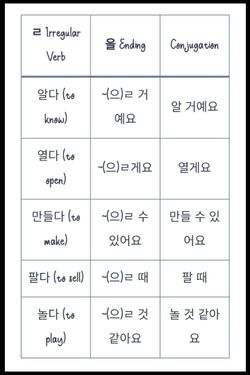
🌟ㅂ Irregular Verb
쉽다 To be easy
맵다 To be spicy
춥다 To be cold
덥다 To be hot
돕다* To help
곱다* To be charming, to be lovely
굽다 To roast, to bake
깁다 To sew, to mend
줍다 To pick up; To find
눕다 To lie
무겁다 To be heavy
가볍다 To be light
고맙다 To be thankful
어렵다 To be difficult
더럽다 To be dirty
무섭다 To be scary, to be frightening
두렵다 To be fearful, to be scared
반갑다 To be glad, to be pleasant
부럽다 To be envious
어둡다 To be dark, to be gloomy
즐겁다 To be pleasant, to be enjoyable
귀엽다 To be cute
참답다 To be truthful, to be sincere
새롭다 To be new
외롭다 To be lonely, to be solitary
해롭다 To be detrimental
이롭다 To be beneficial
아름답다 To be beautiful
까다롭다 To be picky to be choosy
흥미롭다 To be interesting
------------------------------------------------
🌟ㅅ Irregular Verb / ㅅ 불규칙
긋다 To draw (a line)
낫다 To be better; To be cured
젓다 To stir, to whip
잣다 To spin
짓다 To build, to write
잇다 To connect, to link
붓다 To swell; To pour
특징짓다 To characterize
눈물짓다 To shed tears, to weep
농사짓다 To farm
가로젓다 To shake your head
🌟ㅅ Irregular Verb / ㅅ 불규칙
긋다 To draw (a line)
낫다 To be better; To be cured
젓다 To stir, to whip
잣다 To spin
짓다 To build, to write
잇다 To connect, to link
붓다 To swell; To pour
특징짓다 To characterize
눈물짓다 To shed tears, to weep
농사짓다 To farm
가로젓다 To shake your head
-----------------------------------------------
🌟 ㅡ Irregular Verb / ㅡ 불규칙
크다 To be big
쓰다 To write; To use
끄다 To turn off
예쁘다 To be pretty
바쁘다 To be busy
아프다 To be painful, to be sick
고프다 To be hungry
나쁘다 To be bad
기쁘다 To be happy
슬프다 To be sad
잠그다 To lock
모으다 To gather, to collect
--------------------------------------------
🔰ㄷ Irregular Verb / ㄷ 불규칙
듣다 To listen; To hear
묻다 To ask
걷다 To walk
싣다 To load
붇다 To swell; To rise
치닫다 To run up, to go up
깨닫다 To realize, to notice
파묻다 To bury
알아듣다 To understand, to follow
Regular ㄷ Verbs
닫다 – to close
믿다 – to believe
받다 – to receive
얻다 – to get
묻다 – to bury
쏟다 – to pour
돋다 – to rise
곧다 – to be straight
굳다 – to harden
딛다 – to step
내딛다 – to step forward
---------------------------------------------
🔰List
ㅎ Irregular Verb / ㅎ 불규칙
까맣다 To be black
하얗다 To be white
노랗다 To be yellow
파랗다 To be blue
빨갛다 To be red
이렇다 To be like this
그렇다 To be like that
저렇다 To be like that over there
어떻다 To be like what, to be how
-------------------------------------------
🔰ㄹ Irregular Verb / ㄹ 불규칙
열다 To open
멀다 To be far
살다 To live
팔다 To sell
놀다 To play
알다 To know
달다 To weigh; To be sweet
불다 To blow
길다 To be long
걸다 To hang
밀다 To push, to nudge
울다 To cry, to weep
들다 To hold, to take
돌다 To turn, to rotate
풀다 To untie, to undo
늘다 To grow, to increase
갈다 To replace; To sharpen
물다 To bite, to snap [animals]
만들다 To make
힘들다 To be difficult, to be tiresome
이끌다 To lead, to guide
거칠다 To be rough, to be coarse
기울다 To incline, to tilt
달려들다 To attack, to spring out at.